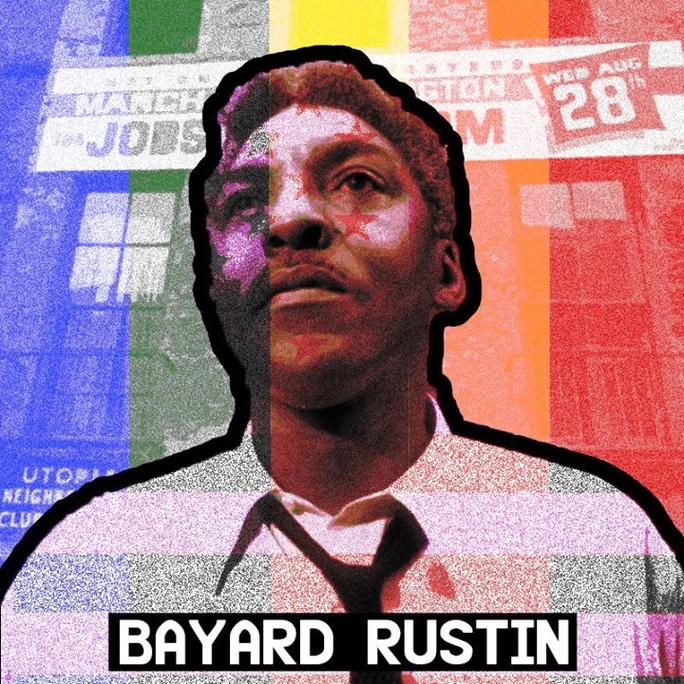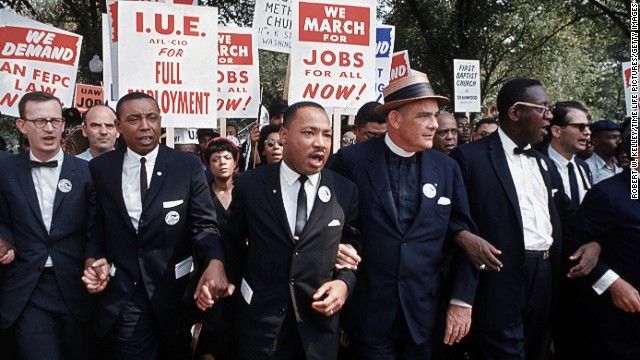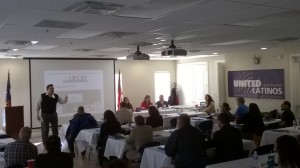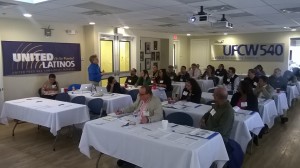February 9, 2015
UFCW Celebrates Black History Month: Bayard Rustin–An Overlooked Champion of Civil and Labor Rights
One of the greatest moments of the Civil Rights era was the March on Washington in 1963–one of the largest non-violent protests to ever occur in America. The March on Washington brought thousands of people of all races together, in the name of equal rights for everyone–whether they were black or white, rich or poor, Muslim or Christian. Dr. Marin Luther King, Jr. made one of his most inspiring and famous speeches at the march, which culminated on the National mall.
But history has often overlooked the man who was the driving force behind this monumental event–a man named Bayard Rustin. Rustin was the one who organized the march, bringing methods used by Gandhi as well as the Quaker religion to Washington to ensure peace, but also impact. It was Rustin who helped shape Dr. King into the iconic symbol of peace he is remembered as.
As a young adult, Rustin worked with many kinds of people who influenced his activism, including ministers and labor organizers. During World War II, Rustin fought against racial discrimination in war-related hiring, and was later jailed for two years after refusing to enter the draft. Then, after protesting segregated transit systems, he was sentenced to work on a chain gang for several weeks.
Despite being punished for his beliefs, Rustin continued to work towards changing things for the better. In 1953, Bayard Rustin arrived in Montgomery, Alabama to partake in the famous bus boycott that kicked off after Rosa Parks was arrested after refusing to give up her seat on the bus for a white man. The boycott brought many civil rights leaders to the area, including a young Dr. Martin Luther King, who had not yet embraced non-violence. But Rustin taught many who were partaking in the boycott how Gandhi had used peaceful tactics to bring change in India, and people saw the importance of these tactics, and began to embrace them, focusing on direct protest.
Rustin was also a champion of workers rights. In 1965, Rustin and his mentor A. Philip Randolph co-founded the A. Philip Randolph Institute, a labor organization for African-American trade union members. Much of his work emphasized that labor rights were an integral part of the civil rights movement.
Although Bayard Rustin was a tireless activist, his life achievements are unknown to many, and he has even been called the “lost prophet” of the civil rights movement. This is largely because not only was Rustin silenced and threatened like many others were for being a black man speaking out for equal rights, but also because he was openly gay in a time when homophobia and bigotry was rampant. Rustin continued his life as an openly gay man, even after being incarcerated for it, and is seen as a champion of the LGBT movement still today. Despite being beaten, arrested, jailed, and fired from various leadership positions, Rustin overcame and made a huge impact on the civil and economic rights movements.
America has a long way to go before Rustin’s dreams of equal human rights for all are achieved, but without him, we perhaps would not be where we are today. Today, we have a black president, more women in leadership positions, and more of legislation in the states overturning old and outdated laws barring gay couples from marrying. These are just a few examples of the progress our country has made since Rustin’s time, and working people will continue to work so that ALL people have equal rights–at work and at home.
February 4, 2015
UFCW Celebrates Black History Month: Addie Wyatt
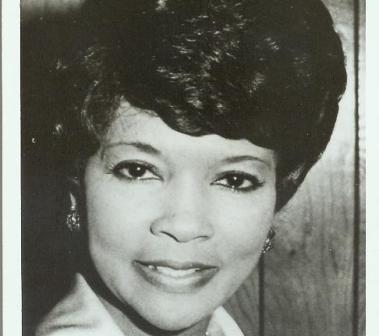 Every year, The UFCW and its members take time to remember people in our union who broke barriers, fought for justice, and paved the way for working class Americans today.
Every year, The UFCW and its members take time to remember people in our union who broke barriers, fought for justice, and paved the way for working class Americans today.
As part of our annual celebration of Black History Month, we’re looking back at beloved UFCW member Addie Wyatt’s story.
Addie Loraine Cameron, better known as Addie L. Wyatt (1924 –2012), was born in Mississippi and moved to Chicago with her family in 1930. When she was 17 years old, she married Claude S. Wyatt, Jr.
She began working in the meatpacking industry in 1941 in the canning department to pack stew in cans for the army. Due to a contract between Armour and the United Packinghouse Workers of America (UPWA), she earned more working on the packinghouse floor canning stew than she would have made working as a typist, which is what she had originally applied to be, and joined the UPWA after learning that the union did not discriminate against its members.
In 1953, she was elected vice president of UPWA Local 56. In 1954, she became the first woman president of the local, and was soon tapped to serve as an international representative. She held this position through the 1968 merger of UPWA and the Amalgamated Meat Cutters and Butcher Workmen until 1974, when she became director of the newly formed Women’s Affairs Department. In 1970s, she became the first female international vice president in the history of the Amalgamated Meat Cutters and Butcher Workmen and later served as director of its Human Rights and Women’s Affairs and Civil Rights Departments. She served as the first female African American international vice president of the UFCW after Amalgamated and the Retail Clerks International Union merged in 1979.
Addie’s work for the union as well as in her community played an integral role in the civil rights movement, and she joined Dr. Martin Luther King, Jr. in major civil rights marches, including the March on Washington, the march from Selma to Montgomery, Alabama, and the demonstration in Chicago. She was one of the founders of the Coalition of Labor Union Women, the country’s only national organization for union women. She was also a founding member of the Coalition of Black Trade Unionists and the National Organization of Women.
In 1984, Addie Wyatt retired from the labor movement as one of its highest ranked and most prominent African American and female officials. In honor of her work, she was named one of Time magazine′s Women of the Year in 1975, and one of Ebony magazine′s 100 most influential black Americans from 1980 to 1984. The Coalition of Black Trade Unionists established the Addie L. Wyatt Award in 1987. She was inducted into the Department of Labor’s Hall of Honor in 2012.
Addie’s life is a perfect example of how labor rights are civil rights. At her job, in the union, and throughout all aspects of her life, Addie fought to break barriers for women’s equality, strived to better working conditions, and campaigned for fair treatment of all people, no matter what one’s race. Addie is just one of the many UFCW examples that still inspire members today, as they march on the front lines of social justice, and spread the word about sticking together for a voice on the job.
February 2, 2015
UFCW Celebrates Black History Month
This week marks the beginning of Black History Month–a time to remember and celebrate the rich history of African Americans and the achievements of the civil rights movement.
Black History Month dates back to 1926, when historian Carter G. Woodson and other prominent African Americans dedicated the second week in February as “Negro History Week” to coincide with the birthdays of Abraham Lincoln and Frederick Douglass. In 1976, the celebration was officially recognized and expanded and every U.S. president since then has celebrated Black History Month during the month of February.
This month, the UFCW will highlight milestones in the civil rights movement—including the 50th anniversaries of the march from Selma to Montgomery and the Voting Rights Act. We will also pay tribute to African American labor leaders who fought for fair wages, dignity in the workplace, and the freedom to organize in spite of considerable barriers, and honor their significant contributions to the labor movement.
February 2, 2015
Survey Finds Popularity of “Right to Work” Decreasing
Rasmussen Reports released a national survey showing that only 35% of likely U.S. voters believe “right to work” laws are good for a state’s economy. That’s a ten point decrease from a similar study conducted in December 2012.
UFCW members have been lobbying elected officials for years on the disastrous effects of these unfair and unnecessary laws. There is still more work to be done as “right to work” battles are underway in Wisconsin, Missouri, New Mexico, Ohio, New Hampshire, Colorado, Kentucky, Montana, Pennsylvania, and West Virginia
“Right to work” laws are being pushed by corporate special interests who want to lower wages so that corporations can have even more profits and power.
In the coming weeks, UFCW members will be in state capitals across the nation to ensure that legislators take notice of this survey and oppose “right to work.”
January 30, 2015
UFCW Intl President Marc Perrone on Safeway Albertsons Merger
 (WASHINGTON, D.C.) – Marc Perrone, International President of the United Food and Commercial Workers International Union (UFCW), today released the following statement in response to Safeway’s merger with Albertsons:
(WASHINGTON, D.C.) – Marc Perrone, International President of the United Food and Commercial Workers International Union (UFCW), today released the following statement in response to Safeway’s merger with Albertsons:
“More than 250,000 Safeway and Albertsons workers are members of the United Food and Commercial Workers Union (UFCW). UFCW members also work for several other Cerberus Capital Management-operated supermarkets across the country, including Albertsons, Acme, Jewel-Osco and Shaw’s.
“UFCW members have a history of negotiating union contracts with Safeway, Albertsons and Cerberus Capital Management. Together in their union, these workers have been able to ensure that union grocery jobs are the best jobs in the industry with fair pay, decent benefits, and job security – all the while ensuring that their companies are able to be profitable and successful.
“UFCW members in California stores that were divested by Albertsons are pleased to learn that the grocery store chain Haggen will acquire many Albertsons stores in California. Haggen workers in the Pacific Northwest are also members of the UFCW. UFCW members across the country are looking forward to working with Safeway, Cerberus, and Haggen on issues that pertain to the members and industry. Our members plan to continue to serve their customers and their communities with pride.”
January 30, 2015
Make Your Super Bowl Celebration Union-Made!
Originally posted by the AFL-CIO
 On Super Bowl Sunday next week, some of our larger and faster union brothers—members of the NFL Players Association (NFLPA)—will be battling it out in Glendale, Ariz., at Super Bowl XLIX (49 for those of us who are shaky on Roman numerals). While the Super Bowl carries a union label, from players to broadcast crews to stadium workers—your Super Bowl party spread can too, with union-made in America food and drinks.
On Super Bowl Sunday next week, some of our larger and faster union brothers—members of the NFL Players Association (NFLPA)—will be battling it out in Glendale, Ariz., at Super Bowl XLIX (49 for those of us who are shaky on Roman numerals). While the Super Bowl carries a union label, from players to broadcast crews to stadium workers—your Super Bowl party spread can too, with union-made in America food and drinks.
Check out these union-made Super Bowl party products, compiled by our friends at Labor 411, the union business directory from the Los Angeles County Federation of Labor. Food and drinks are brought to you by the Bakery, Confectionery, Tobacco Workers and Grain Millers (BCTGM), the UAW, Machinists (IAM), the United Food and Commercial Workers (UFCW) and the Teamsters (IBT).
Beer
Beck’s, Budweiser, Busch. Goose Island, Hoegaarden, Land Shark Lager, Leffe Blond, Michelob, Natural, O’Doul’s (non alcoholic), Shock Top, Stella Artois, Iron City, Rolling Rock, Red Stripe, Kirin, Labatt Blue, Stegmaier, Lionshead, Steelhead, Butte Creek, Red Tail Ale, Blue Moon, Henry Weinhard’s, Killian’s, Mickey’s, Molson Canadian, Olde English 800,
Steel Reserve, Miller, Keystone Light, 1845 Pils, Bass Pale Ale, Moosehead, Schlitz, Pabst,
Sam Adams, Hamm’s and Kingfisher Premium Lager.
Meat
Alexander & Hornung, Always Tender, Ball Park, Banquet, Butterball, Dearborn Sausage Co., Farmer John, Farmland, Hebrew National, Hormel, Omaha Steaks, Oscar Meyer, Thumann’s and Tyson.
Snack Food
Act II Popcorn, Bagel Bites, Lay’s, Cheetos, Cheez-It, Chex Mix, Chips Ahoy, Doritos, Fig Newtons, Fritos, Rice Krispies Treats, Rold Gold Pretzels, Ruffle, Triscuit and Wheat Thins.
Chips and Salsa
Mission Chips, Old El Paso Chips, Dips and Salsa, Pace Salsa, Stacy’s Pita Chips, Sun Chips
Tostitos Chips and Salsa.
January 28, 2015
UFCW Local 540 Hosts Immigration Workshop
On January 23-25, UFCW Local 540 hosted an immigration workshop and informational session with more than 50 attendees as part of the UFCW’s Union Citizenship Action Network (UCAN). During the workshop, participants discussed President Obama’s recent executive action on immigration known as Deferred Action for Parents (DAP), along with learning about the naturalization process and Deferred Action for Childhood Arrivals (DACA). The session was run by UFCW Executive Vice President and Director of the Civil Rights and Community Action Department Esther López.
In November, the President put the DAP program in place to remove the threat of deportation for parents of U.S. citizens and legal permanent residents. Many UFCW local unions are hosting similar forums to help members determine whether they qualify, gather necessary documentation, prescreen their applications, and answer important legal questions.
The naturalization and citizenship part of the training provided participants with the platform to learn about the critical skills and tools needed to assist eligible UFCW members and their families to go through the naturalization process to become U.S. citizens. In addition to learning about the naturalization process, participants were also trained to provide assistance to workers or their family members who qualify for immigration benefits under the Obama Administration’s June 2012 memorandum on DACA.
For more information about DAP, visit www.ufcw.org/immigrationaction. If you are interested in sample documents that can help in this process, please contact Amy Gray atagray@ufcw.org. In addition, DAP flyers in English and Spanish are available on the UFCW Political Toolkit at www.ufcwtoolkit.com.
If your local union is interested in hosting a training or taking advantage of upcoming immigration training opportunities, please contact Eduardo Peña at epena@ufcw.org.
January 27, 2015
Member Spotlight: Local 1500’s ‘Battling’ Barbara Balos
Originally posted on Labor Press
 In her 25 years with UFCW Local 1500, Barbara Balos, 48, has helped run several major chain supermarkets throughout the city. For the last several years, the Long Island mom has been the non-foods manager at a bustling Bronx Pathmark, overseeing ordering, deliveries and more. Balos has a knack for getting things done – and that steady determination has not only helped her employers succeed, it’s also helped win better conditions for co-workers; raise a ton of money for numerous charitable organizations, and even change the way New York State protects its children.
In her 25 years with UFCW Local 1500, Barbara Balos, 48, has helped run several major chain supermarkets throughout the city. For the last several years, the Long Island mom has been the non-foods manager at a bustling Bronx Pathmark, overseeing ordering, deliveries and more. Balos has a knack for getting things done – and that steady determination has not only helped her employers succeed, it’s also helped win better conditions for co-workers; raise a ton of money for numerous charitable organizations, and even change the way New York State protects its children.
“I have been a shop steward for Local 1500 for about 8 years, and have many wonderful opportunities with the union,” Balos says.
Many times, Balos is called upon to help correct unsafe working conditions like an overflowed grease pit or wonky loading dock – the kinds of things that could land an unlucky employee in the hospital.
Lately, however, Balos’ problem-solving skills have been tested trying to help co-workers reclaim lost hours guaranteed under their union contract, and securing new apartments for hard-pressed employees who’ve been reduced to part-time status as an unintended consequence of the Affordable Healthcare Act, and no longer able to make the rent.
One co-worker was forced to flee an abusive home environment and actually ended up on the street, while another had his Brooklyn apartment sold beneath his feet.
“Believe it or not, it happens a lot,” Balos says. “Unfortunately, a lot of the people I work with are part-timers. They’re getting 16-hours a week, and it’s tough to make ends meet. With the Obama care law, we’ve had problems with part-timers not getting enough hours, because they can’t go over that 30-hour threshold, so a lot of times, management will cut back on hours. But we help out our own.”
Over the course her union career, Balos has repeatedly met with members of the New York City Council, to make sure they understand just how important labor unions continue to be for workers like her.
“People are afraid to talk to management and stand up for their rights, or even to ask a question,” says Balos. “Many times, management will try to get away with things they shouldn’t.”
Just this past Christmas, Balos says the nicest present she received was a phone call from an older co-worker who faced the very real possibility of losing his job after arbitrarily being reassigned to a position he was not well-suited.
“I became a shop steward because I truly enjoy helping people and consider the other members as my family,” Balos says. “We rally around each other.”
Balos initially became politically active about 11 years ago, following a devastating incident which compelled her to try and convince the New York State Legislature to toughen the laws concerning convicted sex offenders.
“At the time, anyone who was a level 2 or 3 sex offender got off their probation period, and were off the sex offense registry,” Balos says. “There was talk from some senators about passing a bill to keep those offenders on the registry for life. So, I wrote to my local senator, told my story, and got a few thousand petitions signed to change the law.”
Not long after that, the Local 1500 shop steward was shocked to learn that her moving appeal would be heard on the floor of the New York State Senate.
“It was a great honor to help out,” Balos said. “We won that battle and got the laws changed. It was wonderful to know that I was a part of that.”
Balos continues to be passionate about activism, especially union activism.
“I think people are trying to cut corners and cut costs,” Balos says. “But our union can be tough. And management, no matter where they are, doesn’t want that.”
For the last few years, Balos’ daughter has been working at a non-union shop while attending college. For the Balos household, the enduring importance of organized labor is not some abstract ideological question to batted around endlessly by elites. Its efficacy is demonstrated daily in real life.
“When [my daughter] first started there, literally ever day, she should would come home saying, ‘I’m going to get fired. My boss is going to fire me because I asked for this day off. He just fired another person for no reason,’” Balos says. “There have been a lot of things that she goes through where I tell her – if you were union, that would not happen.”
January 21, 2015
UFCW Members in New Mexico Ready to Stop “Right to Work”
 Last week, UFCW Local 1564 led a right to work training session for more than 100 New Mexico union members. At the training, members learned how much harm right to work would bring to workers in New Mexico.
Last week, UFCW Local 1564 led a right to work training session for more than 100 New Mexico union members. At the training, members learned how much harm right to work would bring to workers in New Mexico.
For the first time since 1952, New Mexico’s State House is controlled by Republicans. One of the State House’s priorities going into the 2015 legislative session is to dismantle the rights of workers and pass an unfair right to work law.
“I currently work at Albertson’s and have been a UFCW member for over 40 years,” said UFCW Local 1564 member Eddie Burns. “I’m very concerned about the possibility of right to work in New Mexico. This will hurt our ability to stick together and bargain for the fair wages and benefits that we deserve. It just seems like a completely unfair law to both working and middle class families.”
To some UFCW Local 1564 members, right to work was not new to them. Paul Bolton, a meat cutter at Smith’s in Albuquerque, recalled how much worse his job was when he worked in Texas, a right to work state.
“When I worked in Texas I had the same job as I do now in New Mexico only I had less pay, fewer benefits and absolutely no job security,” he said. “The health care was even worse – when I had my child I was forced to pay an enormous amount out of pocket. It was hard to afford. If that happened while I was working here in New Mexico it would not have been so stressful.”
Workers left the training ready to stop right to work by lobbying their legislators at the Capitol in Santa Fe.
“I’m looking forward to lobbying in Santa Fe,” said Maria Ana Griego, a UFCW Local 1564 member who works at Smith’s. “Legislators from New Mexico should help people from New Mexico and they need to hear that from workers like us. Right to work just gives more to outside corporations. It’s workers who need more – not corporations.”
January 20, 2015
President Obama Urges Strengthening of Unions in His 6th State of the Union Address
 Last night, UFCW members gathered around televisions, logged on to their computers, or followed along on their tablets and smart phones as President Obama delivered his State of the Union Address.
Last night, UFCW members gathered around televisions, logged on to their computers, or followed along on their tablets and smart phones as President Obama delivered his State of the Union Address.
President Obama unveiled a number of proposals aimed at strengthening working and middle class Americans. They included:
- Strengthening unions and building more worker protections, such as maternity leave and seven days of sick leave for all.
- Two free years of community college.
- A call for affordable high-speed internet access.
- A plan that would provide tax breaks to working and middle class families, paid for by closing loopholes and deductions commonly used by the wealthiest Americans.
- Providing affordable, high quality childcare for working parents.
As they consumed the speech, UFCW members reacted through texts and social media to what they were hearing, and what else they hoped to see the President mention:
“Raise the minimum wage. Give more tax breaks to households making under 100K a year.” –UFCW Local 8 member
“It’s important for everyone to have the freedom to bargain collectively!” –Pat Preston, Local 400 Member
“The backbone of a strong economy is the working families of the middle class.” –Donovan Jurss
“‘Right to work’ laws lower our standard of living.” –Andrew Meyers
“It’s time for working families to stop carrying the 1% on their backs! The wealthy and big business must pay their fair share!” –Shirley Bennet, Local 75
“Cap CEO salaries.” –Margaret Wolf, Local 75
“We need flexible schedules without penalty of pay loss.” –Maria Rose
“Why do working families need to work 2 to 3 jobs to survive? What happened to the ‘full-time’ job?” –Todd Walters
The economy has improved in six years, but UFCW members are still not feeling the full effects. Worker pay is not growing fast enough, income inequality is rampant, and a college education remains difficult to afford. These issues and more need to be addressed on Capitol Hill and inside State Houses before the state of our union can be considered truly strong.

